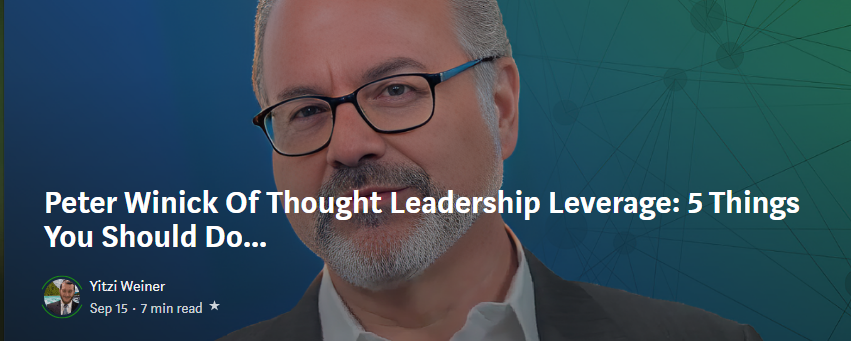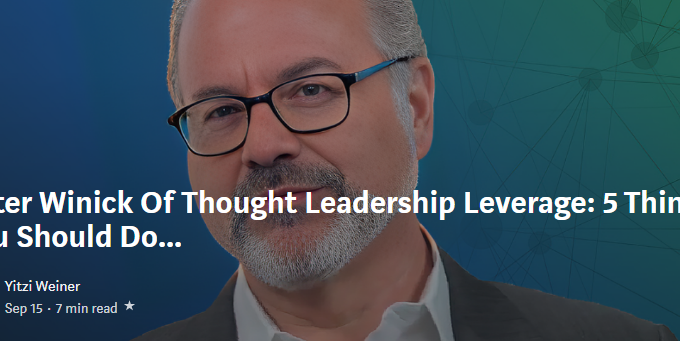Check out Thinkers360! Peter Winick is listed among the top 100 Thought Leaders, Analysts &…
5 Things You Should Do To Become a Thought Leader In Your Industry

Source: Peter Winick Of Thought Leadership Leverage: 5 Things You Should Do To Become a Thought Leader In Your Industry
Author: Yitzi Weiner – A “Positive” Influencer, Founder & Editor of Authority Magazine, CEO of Thought Leader Incubator
… It starts with a strategy, full stop. A solid thought leadership strategy focuses on who you are going to serve, how you are going to serve them. Do you know (with a high level of certainty) who your avatars are? What are their pain points? You need to make sure that your “stuff” is solving a problem that people need and will pay to solve.
As far as what strategies they are bespoke to each thought leader and their situation. There is no one size fits all approach. If you have clarity then you can effectively prioritize the infinite number of tactics that you can and should invest in. Typically the area of weakness is on the marketing, sales and distribution side.
Aspart of our series about how to become known as a thought leader in your industry, I had the pleasure of interviewing Peter Winick
Peter Winick is the founder and CEO of Thought Leadership Leverage. For the past two decades, he has helped individuals and organizations build and grow revenue streams through designing and growing their thought leadership platforms as well as acting as a guide and advisor for increasing business-to-business sales of thought leadership products.
His clients come from a diverse set of backgrounds and specialties. They include New York Times bestselling business book authors, members of the Speakers’ Hall of Fame, recipients of the Thinkers50 award, CEOs of public and privately held companies, and academics at prestigious institutions such as Yale, Wharton, Dartmouth, and London School of Business.
Thank you so much for doing this with us Peter! Our readers would love to “get to know you” a bit better. Can you share your “backstory” with us?
Ofcourse. I’ve always been passionate about two things. Entrepreneurship and what we now call thought leadership. I treated them for a long time (probably the first 15 years of my career) as two very different interests that I had or things that I was good at. I realized over 20 years ago that they can actually be two sides of the same coin. I was brought in to do a turnaround for a global communications consulting firm. Turnaround is a polite way of saying “fix a very broken business”. That company built out it’s brand because it’s founder wrote a book in the 1960’s that took off. It forced me to think about and ask the question “What’s the underlying business model for the author”. I had read hundred, maybe thousands of books by that time and never thought to ask that question. Now it’s a question I answer for folks everyday and have built a business focusing on solving that problem.
Can you briefly share with our readers why you are an authority about the topic of thought leadership?
I’d leave it to them to come to that conclusion as I don’t like people that call themselves experts or thought leaders. That being said I’ve been working with and have worked with hundreds of thought leaders from around the world as well as world-class universities, nonprofits and Fortune 1000 companies helping them figure out how to effectively develop, deploy, curate, and monetize their thought leadership. I also am the co-host of the #1 podcast in the space “Leveraging Thought Leadership” which now has well over 400 episodes.
Can you share the most interesting story that happened to you since you started your career?
One of the things I love about what I do is that I get to work with and meet some of the most interesting and smartest people on the planet. What I find interesting is that they have more in common than one might think. There’s a public persona and a brand which is what is put out into the world and the most fascinating ones are so aligned with those things on a personal level that they are just a pure joy to work with.
Can you share a story about the funniest mistake you made when you were first starting? Can you tell us what lesson you learned from that?
There are a few but I think there are NDA’s in place that would prevent me from doing so.
Ok, thank you for that. Let’s now jump to the main focus of our interview. In a nutshell, how would you define what a ‘Thought Leader’ is? How is a thought leader different from a typical leader? How is a thought leader different from an influencer?
Great question. I think there are a few key components of being a thought leader. Let’s break that apart a bit. The first is obviously thought! Not that influencers don’t think, but… So in order to be a thought leader you need to be thinking; that might be original research, it might be based on observations you’re able to make based on your role or domain expertise or life experiences. Being thoughtful takes effort, focus and dedication. Not that influencers aren’t focused and dedicated, but….
The second piece is the leadership side. You need to have the courage to take the field, the domain that you have the expertise in and lead it into a new space. It doesn’t need to be radically new but it needs to add value to the current body of work. I also think that as a term no one should call themselves a thought leader, ever! It’s a term that is bestowed onto you but others in the field that you respect.
As for leaders, most leaders are awesome leaders. They set the strategy, allocate resources, develop a culture and achieve the results they set out to. Some leaders are thought leaders but not many. Some thought leaders are leaders but not many either. They are very different roles that require very different mindsets and skill sets.
As for influencers, I am not a fan of that term from the standpoint of it’s obvious that their objective is to influence my thinking, my behavior and/or my beliefs. In practice, it’s usually to do something that benefits the influencer. When people internalize solid thought leadership they benefit as much as or more than the thought leader does.
Can you talk to our readers a bit about the benefits of becoming a thought leader? Why do you think it is worthwhile to invest resources and energy into this?
I think it is the single best way, the most cost-effective way, and the most engaging way to build your brand (personal or business); to let those that are important to you or could be important to you know how you think and what you stand for and how you can help them. You may have (and probably do) competitors that are far bigger than you, more established than you; that can outspend. Thought leadership levels the playing field. Ideas can be democratized and spread without the need for a massive ad budget. Quality and consistency are key.
It also gives you a tremendous competitive advantage whether in the context of your career, your team, or your organization.
Let’s talk about business opportunities specifically. Can you share a few examples of how thought leadership can help a business grow or create lucrative opportunities?
There are two ways to think about this. 1) Is the thought leadership the “product”. This applies to authors, speakers, academics, thought leaders and small consulting firms. There are multiple ways to directly monetize thought leadership. Keynotes speaking, licensing, video-based training, masterminds, creating an institute, coaching. The list is almost endless. Its’ critical to have a strategy that helps you think through who you are trying to serve and how they prefer to consume content.
2) The second way to think about this is at the organizational level. In this case thought leadership is a great way to stay connected to the communities that matter; elevate your brand, show the marketplace that you have a unique perspective, stay connected with various constituents during a long and complex sales cycle and of course, it can be used for new client acquisition.
Ok. Now that we have that behind us, we’d love to hear your thoughts about how to eventually become a thought leader. Can you share 5 strategies that a person should implement to become known as a thought leader in their industry? Please tell us a story or example (ideally from your own experience) for each.
It starts with a strategy, full stop. A solid thought leadership strategy focuses on who you are going to serve, how you are going to serve them. Do you know (with a high level of certainty) who your avatars are? What are their pain points? You need to make sure that your “stuff” is solving a problem that people need and will pay to solve.
As far as what strategies they are bespoke to each thought leader and their situation. There is no one size fits all approach. If you have clarity then you can effectively prioritize the infinite number of tactics that you can and should invest in. Typically the area of weakness is on the marketing, sales and distribution side.
I have seen some discussion that the term “thought leader” is trite, overused, and should be avoided. What is your feeling about this?
I think there’s a trend towards that however I’m not concerned. People are smart and true thought leadership is hard to consistently and effectively create. Quality stands out above all else. I actually think that on the organizational side it’s the very beginning of a new field, a new function that most organizations will figure out how to embrace and master.
What advice would you give to other leaders to thrive and avoid burnout?
Not to confuse activity with productivity.
You are a person of enormous influence. If you could inspire a movement that would bring the most amount of good to the most amount of people, what would that be? You never know what your idea can trigger. 🙂
Be generous with your ideas, times, and relationships. ABH, Always be helping! Especially those you serve or desire to serve.
How can our readers further follow your work online?
They can visit our site at www.thoughleadershipleverage.com or our podcast Leveraging Thought Leadership. We are also on LinkedIn https://www.linkedin.com/in/peterwinick/ and twitter
Thank you so much for your insights. This was very insightful and meaningful.



